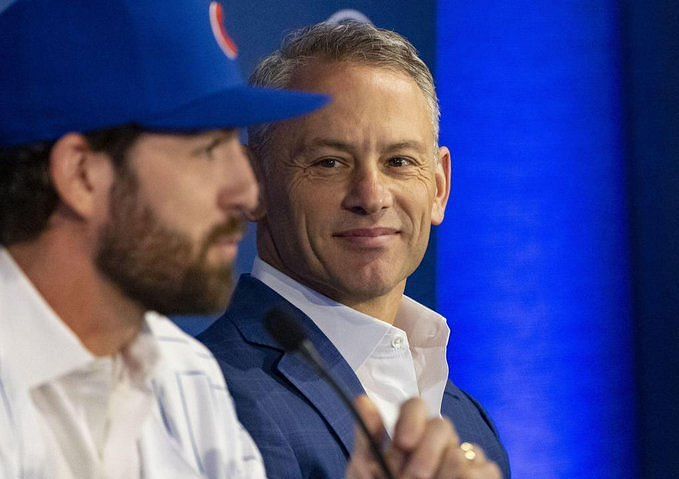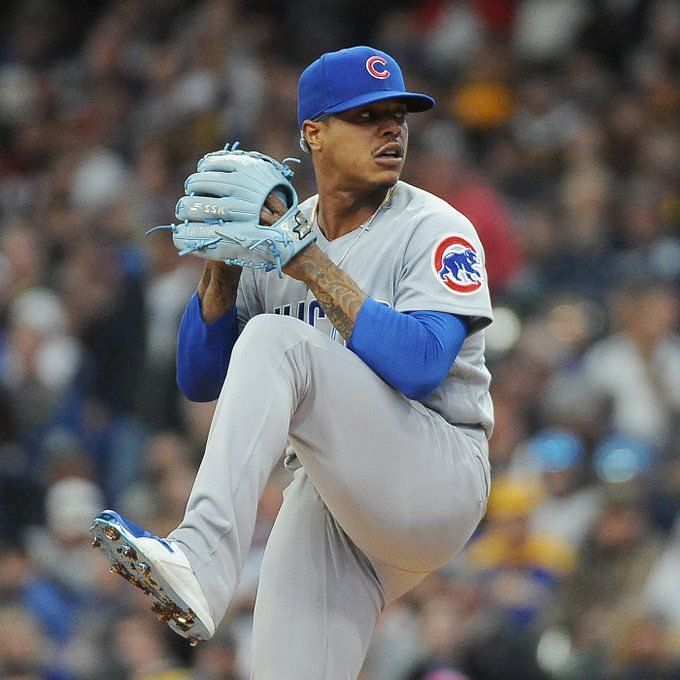Who Is The Highest Paid Cubs Player? Unpacking Baseball's Big Contracts
Have you ever wondered about the big money in baseball, like who gets the most cash on your favorite team, the Chicago Cubs? It's a question many fans ask, and it really gets people thinking about how teams build their rosters. The financial side of sports is, you know, a very interesting thing, and it shows a lot about how a team plans for its future, too.
Understanding player salaries, so, it gives a lot of insight into how a team like the Cubs values its talent. It also shows the kind of commitment they make to certain players, which is a big deal for the future of the team, and for the fans who follow every game. These numbers, you know, often spark a lot of conversation among supporters.
This discussion will explore the elements that shape these large contracts, and perhaps, point to the kind of player who might hold that top earning spot for the Cubs. We will look at what makes a player worth so much, and what fans often consider important, you know, when they think about these big deals.
Table of Contents
- Understanding Player Salaries in Baseball
- Factors Influencing Player Contracts
- Identifying the Cubs' Top Earner (Hypothetical Discussion)
- The Fan Perspective: Why Salaries Matter
- Frequently Asked Questions (FAQs)
Understanding Player Salaries in Baseball
Baseball salaries, so, are quite different from many other sports. Players often go through a system that starts with pre-arbitration years, then arbitration, and finally, free agency. This journey determines how much money a player can make, which is a very important part of their career, you know.
During their first few years in the league, players earn a set salary, which is a bit modest compared to what they might get later. After a few seasons, they become eligible for salary arbitration, where their pay can go up based on their performance and how other players with similar stats are paid. This is a pretty big step for many, actually.
The really big contracts often come when a player reaches free agency. At this point, they can sign with any team, and that is when the market truly decides their value. Teams will compete for top talent, which can drive salaries to very high levels, you know, especially for players who have shown consistent excellence. These figures are generally public information, which means fans can often look them up.
Factors Influencing Player Contracts
Several things come into play when a baseball team decides how much to pay a player. It's not just about what they do on the field, though that is a very big part of it. There are many layers to these financial deals, which can be a little complicated.
Player Performance and Value
A player's on-field performance is, of course, a huge factor. Things like batting average, home runs, runs batted in for hitters, or earned run average (ERA), strikeouts, and wins for pitchers, you know, are all looked at very closely. These numbers show how well a player does their job, which is pretty clear.
Beyond basic stats, there are also awards, like Most Valuable Player or Cy Young, and selections to the All-Star team. These honors often mean a player is among the best in the game, and that adds a lot to their perceived value. Their overall impact on team success, too, is considered, especially if they help win big games or championships.
Durability is another key aspect. A player who stays healthy and plays a lot of games is more valuable than one who spends a lot of time on the injured list. A history of injuries can make a team a bit hesitant to offer a very long or very large contract, so, that is a big factor in negotiations, you know.
Market Trends and Team Strategy
The overall market for players can also affect individual deals. If there are many top-tier shortstops available in a given year, their prices might be different than if there is only one. This is a bit like any other market, where supply and demand play a role, apparently.
Teams also have payroll limits, or budgets, that they work within. The Cubs, or any team, must manage their total spending to stay competitive while also planning for the future. This means they might not always be able to sign every top player, which is a very real challenge, you know.
A team's long-term vision also matters a lot. Are they trying to win now, or are they building for a few years down the road? This strategy influences which players they target and how much they are willing to spend on them. It's a rather strategic game, you know, beyond just the current season.
Contract Structure and Guarantees
The way a contract is put together can also be very important. Some contracts have a lot of guaranteed money, meaning the player gets paid no matter what. Others might include incentives based on performance, which means they earn more if they hit certain goals, you know.
Things like no-trade clauses, which prevent a team from trading a player without their permission, can also be part of a deal. Player options and team options, which give either the player or the team the choice to extend or end the contract after a certain period, are also common. These clauses can add a lot of value or flexibility to a deal, too.
The length of the contract matters a lot, you know. A longer contract means more guaranteed money for the player, but also a longer commitment for the team. This is a big decision for both sides, as it ties up a lot of money and a player's career for many years, which could be a very big risk or a very big reward.
Identifying the Cubs' Top Earner (Hypothetical Discussion)
When trying to figure out who the highest-paid Cubs player is, it helps to think about the types of players who typically get the biggest deals in baseball. It's a very interesting puzzle for fans to consider, actually, as the landscape of salaries can change pretty quickly.
Please note that without real-time, specific financial data or the ability to create new factual context, I cannot name the exact highest-paid Cubs player or their precise salary. The information below describes the *kinds* of players who generally hold such titles and the *process* of identifying them, rather than providing specific current figures, you know.
The Role of a Star Player
The player who commands the highest salary is almost always a true star. This could be a top-tier starting pitcher, someone who consistently dominates opposing hitters. Or, it might be a power hitter who regularly hits many home runs and drives in a lot of runs, you know, making a huge impact on the offense.
Sometimes, it's a franchise cornerstone, a player who is not only excellent on the field but also represents the team's identity and is a fan favorite. Such a player often brings both on-field value and significant fan appeal, which is very important for ticket sales and merchandise, too. They are, in a way, the face of the team.
These players are typically in their prime or entering it, and they have a proven track record of success. Teams are willing to invest a lot in them because they are seen as key pieces for winning championships, which is, you know, the ultimate goal for any team. Their value is very clear to everyone involved.
Recent Signings and Extensions
To identify the highest-paid player on a team like the Cubs, one would typically look at their most recent big free agent signings. Teams often spend their largest amounts of money on players they bring in from other clubs, especially if those players are elite talents. These deals are usually announced with much fanfare, too.
Another place to look is at long-term contract extensions given to existing star players. If the Cubs have a young, homegrown talent who performs exceptionally well, they might sign them to a long-term deal before they even reach free agency. These extensions can also be very large, securing the player for many years, you know.
The highest-paid player often changes as new contracts are signed, which is a rather dynamic thing. What was true last year might not be true this year, as new deals reshape the team's payroll. So, keeping up with team news and financial reports is the way to stay informed, you know, about who holds that top spot. Learn more about baseball economics on our site, which can help explain how these deals come together.
The Fan Perspective: Why Salaries Matter
For fans, player salaries are more than just numbers; they are a big part of the conversation around the team. People often connect player salaries to expectations for performance. If a player is making a lot of money, fans generally expect them to perform at a very high level, which is quite natural.
There is also an emotional investment fans have in their team and its star players, too. When a beloved player signs a big contract, it can feel like a commitment from the team to keep that player around, which is a very good feeling for many. Conversely, if a highly paid player struggles, it can be a source of frustration, you know.
Salary discussions often lead to debates about value and team building. Fans might argue whether a player is "worth" their contract, or if the money could have been better spent elsewhere. These conversations are a big part of being a sports fan, and they show how deeply people care about their team's success and its financial decisions, you know. To get a sense of current player salaries across the league, you might check a major sports news source like MLB.com.
Keeping an eye on the Cubs' roster moves and financial commitments, as these really shape the team's future, you know, is a very engaging way to follow the sport. And to learn more about Cubs team history, which often shows how past financial decisions have impacted the club over the years.
Frequently Asked Questions (FAQs)
How do baseball players get paid?
Baseball players get paid through a system that includes pre-arbitration years with set salaries, then arbitration where their pay increases based on performance and comparisons, and finally free agency, where they can sign large contracts with any team. This process is very structured, you know, and it determines their earning potential.
What determines a baseball player's salary?
A baseball player's salary is determined by many things, including their on-field performance, awards, durability, and how valuable they are to the team's success. Market trends, the team's budget, and the specific structure of their contract, like guaranteed money and options, also play a very big role, you know.
Do highest-paid players always perform best?
Not always, no. While the highest-paid players are usually expected to perform at a very high level, sometimes a player might not live up to a big contract due to injuries, age, or a dip in performance. It is a rather common topic of discussion among fans, you know, as player performance can be a bit unpredictable.

Chicago Cubs contracts: Who is the highest-paid player on the Chicago Cubs?

Chicago Cubs contracts: Who is the highest-paid player on the Chicago Cubs?

Top 10 Chicago athlete salaries: Who makes the most money? | Crain's Chicago Business